Twitter's chemistry community sat up and took note of a new report suggesting chemistry undergraduates' maths needs aren't being met before they embark on their studies.
There has been a lot of reaction in the chemistry education community to a news item published by Education in Chemistry this week. It reported on the findings of an article in Chemistry Education Research and Practice, written by myself and Jessica Bowyer of the Assessment Research Division at Cambridge Assessment, regarding the perceptions of undergraduate chemists on their mathematical preparation. This article was written after a large-scale project was undertaken examining the views of undergraduate students of STEM and social science subjects who had taken AS or A Level Maths, and whether they felt they were well-prepared for the mathematical demands of their degree. Chemistry was just one subject investigated.
The article reports on the views of 332 undergraduate chemists from across 19 different universities. Whilst it was only a requirement to have taken AS Level maths in order to take part in our online questionnaire, 40.7% of participants had actually taken A Level Are chemistry undergrads mathematically prepared for their degrees? maths along with AS Level or A Level Further Maths. Obviously, this makes the sample slightly skewed because, at present, all but 20 of the 52 institutions currently offering single honours three-year undergraduate chemistry degrees only require applicants to achieve more than a C grade in GCSE maths. Only six universities (all, arguably, higher-ranking universities) require students to achieve certain grades in A Level maths. This is an increase from just two universities requiring A Level maths in 2010.
The outcome of this study was that Jessica and I suggested that universities should recommend prospective applicants study A Level Maths, as it acts as a signpost for the fact that chemistry degrees are mathematically demanding, and because it will likely be Our research attracted a number of tweetsgood preparation for the demands of their course. For all universities to require students take it could cause further problems for the uptake of chemistry at a time when chemistry doesn't attract the number of students it hopes to, and that's an issue, understandably, highlighted by some of the comments from teachers on Twitter.
The article has attracted a number of tweets raising some interesting questions, a few of which I've answered below.
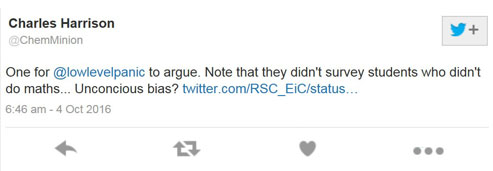
Charles is right to highlight the fact that we didn’t survey undergraduate chemists who hadn’t taken A Level maths. This is because the research we were doing was geared towards assisting OCR (Cambridge Assessment’s UK exam board) in the development of the content of its new A Levels in Maths and Further Maths. OCR was keen to ascertain the mathematical skills and content that undergraduates of STEM and social science degrees would find useful as preparation for the mathematical demands of such courses. Therefore, we surveyed students who had taken the A Levels to see whether they thought they had been good preparation or if there was room for improvement. Obviously, this means that the views of students with only GCSE maths were not taken into consideration in our study, but they certainly would be the subject of future research. The Higher Education Academy conducted a small survey in 2014 regarding mathematical preparation of students for undergraduate chemistry and included those who had not taken A Level maths, so this might be of interest.
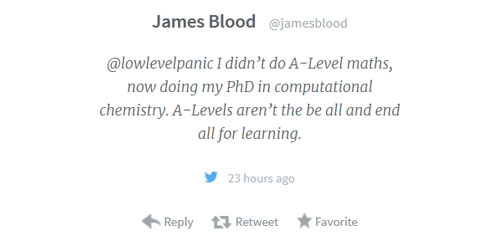
It certainly isn’t the case that students like James who haven’t taken A Level Maths won’t have the aptitude to be successful in undergraduate chemistry, particularly if their university tailors their courses well for the minimum entry requirements expected of its students. However, the data we collected in our study certainly suggested that A Level maths is viewed by those who took it as good preparation for their degree. This is why, if universities were to recommend it to prospective applicants, it would at least indicate that maths is an important part of chemistry, and encourage students to take the opportunity to get a head start through developing their mathematical skills before beginning their course.
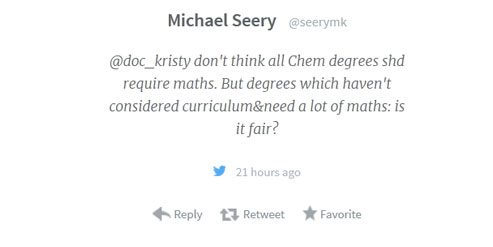
Michael makes an important point here. If universities only require students to have achieved a C grade in GCSE maths, it’s important that they are familiar with the skills and content of the GCSE and what a student who achieves a C can do, so that new undergraduate students are able to keep up with the mathematical demands of their degree.
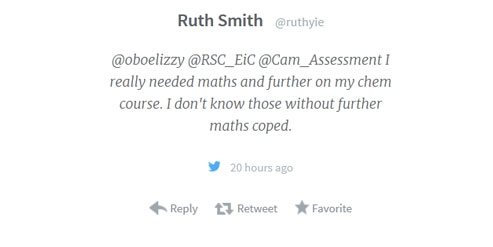
Ruth is very much in the minority when it comes to having studied A Level Further Maths prior to studying undergraduate chemistry, but her experience rings true with our findings. Those students in our study who had taken it were very positive, with 86.4% of those who had taken Further Maths at AS or A Level describing it as good preparation for the mathematical demands of their course. However, not all schools are able to offer Further Maths at A Level (even though initiatives such as the Further Mathematics Support Programme are working hard to increase the uptake of Further Maths) so if universities required it, it would never be fair in terms of access and would likely harm student recruitment. Again, it’s all about tailoring courses to the mathematical background of students and ensuring that additional support is available for those students who struggle.
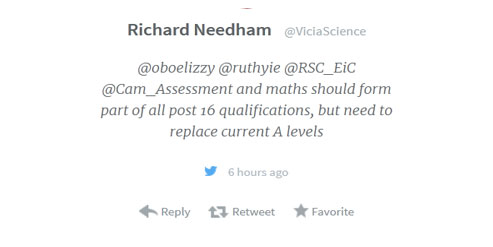
In line with Richard's comment - changes have recently come into place which aim to increase the mathematical content and demand of A Levels such as chemistry so, hopefully, this will increase students' ability to use maths in chemistry contexts when they go to university.
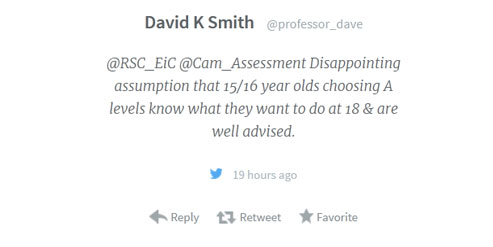
David is making an excellent point here, and it’s hoped that research such as ours can inform the advice given by teachers, careers advisers and universities to students considering going on to study degrees in STEM and social science. The findings of our study and the number of chemistry students who take A Level maths shows that there’s work to be done in terms of ensuring that students are given useful advice regarding their A Level choices.
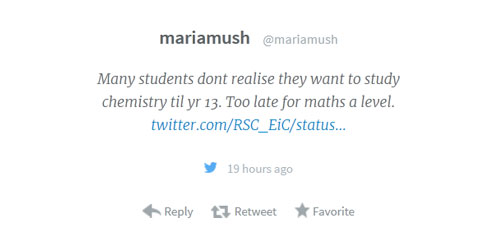
Though, as Maria says, many students will not know at age 16 what degree they will want to do at university (and, if they do, it’s not necessarily the case that that’s what they’ll end up studying!). However, it’s believed that students making A Level choices are becoming increasingly aware of the usefulness of A Level maths as preparation for a wide range of degree courses thanks to various initiatives (e.g. the Russell Group published a list of 'facilitating subjects' for university, which included A Level Maths). A Level Maths is now the most popular A-level subject.
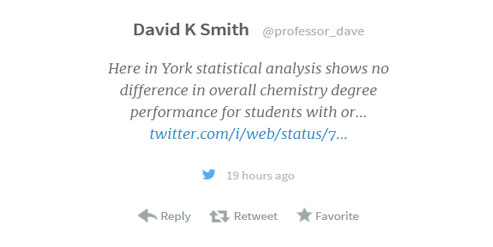
Findings that there are no significant differences in the performance of students who haven’t taken A Level Maths are really encouraging for tosee universities which establish that. Rather than necessarily meaning that A Level Maths isn’t useful preparation for chemistry degrees, this shows that York is doing an excellent job in tailoring their first year courses to the mathematical background of their students, and supporting them through mathematically demanding courses through support work and adapting teaching methods. It’s not always the case that universities will adapt to the changes in secondary curricula, with many expecting students to make the adaptation themselves when this might not always be so easy for some.
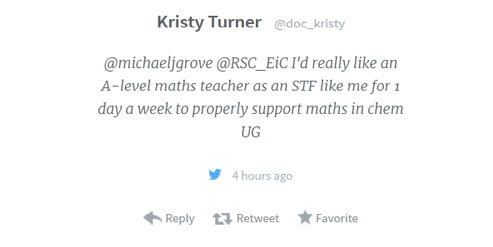
The above suggestion is certainly something which is used by some departments in other scientific subjects, and it seems that it can be very beneficial for students who are struggling mathematically. This is definitely an area which warrants more research and investigation.
I’m really pleased our research has sparked so many conversations about how we can better address the maths needs of students; please continue the debate, talking about your own experiences, sharing best practice, or asking further questions about the research, in the comments section below and I’ll try to respond to as many as possible.
Ellie Darlington
Research Officer, Cambridge Assessment
The images in this blog are taken from the EiC’s Storify collating the Twitter discussion around their original post featuring our research.